Pressure grows on Putin amid anger, chaos after troop call-up
Resistance against Russia’s mobilisation for its war in Ukraine has taken an increasingly violent turn as two recruitment centres comes under attack and borders remained clogged with fighting.
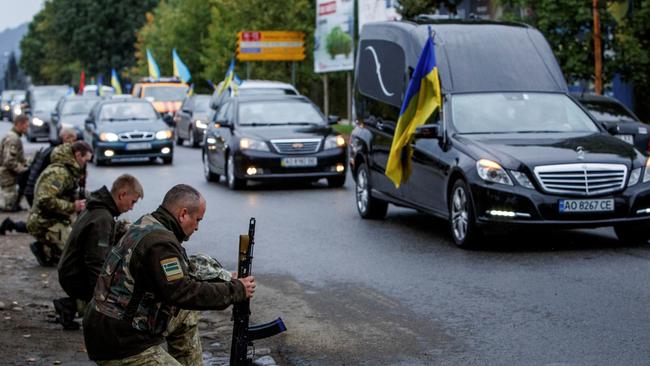
Resistance against Russia’s mobilisation for its war in Ukraine took an increasingly violent turn Monday as two recruitment centres came under attack and borders remained clogged with fighting-age men seeking to leave the country amid reports that some were being turned back.
A Russian man opened fire at a military-recruiting station in Siberia, critically wounding its commander, hours after another man rammed a car into the entrance of a different recruitment centre then set it afire with Molotov cocktails.
Officials said the suspected gunman was a 25-year-old resident of the Siberian city of Ust-Ilimsk who had arrived at the recruiting station’s auditorium with a homemade weapon. Before opening fire, the gunman yelled, “Everyone is going home now,” according to local news reports.
Monday’s violence and growing lines at the border are the latest signs that Mr Putin’s initiative to reinvigorate a stalling war effort in Ukraine could backfire, pushing some Russian men to choose between being called up and leaving the country.
Many Russian men who can afford to flee have choked airports and border points, amid reports that the country’s border officials had begun refusing to let men of military age leave. The mobilisation order has also laid bare resentments in Russia’s far-flung poorer regions which have been targets of recruitment drives.
The shooting suspect in Monday’s attack, identified by authorities as Ruslan Zinin, is unemployed, and his mother told an independent media outlet that he wasn’t subject to a mobilisation order but was upset that a close friend had received one.
Mr Zinin was arrested shortly after the shooting. State-run news service RIA Novosti circulated a picture of the weapon used in the attack that was crudely fashioned from a block of wood, a pipe and a common pipe strap. The commander of the recruiting station is in critical condition, the regional governor’s office said.
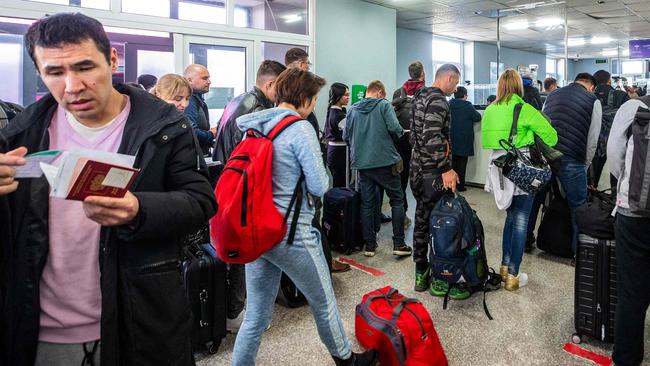
Though most Russians have broadly supported the war in Ukraine, few have shown enthusiasm for fighting in it, and pollsters say that support for the war will face a new test when mobilisation begins sweeping up average Russians in major cities.
Mikhail Vinogradov, president of the St Petersburg Politics Foundation, a research centre, said mobilisation had triggered “a surge of anxiety in society,” unprecedented in the recent history of Mr Putin’s presidency.
“But so far it’s not clear whether the panic will subside or increase and whether newly dissatisfied people will be ready for any action,” Mr Vinogradov said.
“So far, the mobilisation itself has not weakened or strengthened Moscow’s military potential.” Some analysts questioned whether the new troops would be ready when they arrive at the front. Recruits have been told they will receive two weeks of training before being sent into combat.
“Who are these people? Just normal men or different ages, some with very little discipline, with very little training,” said Alexander Baunov, a senior fellow at the Carnegie Endowment for International Peace.
The forced mobilisation of soldiers threatens to stymie Moscow’s efforts to defeat Ukraine on the battlefield. Unlike Kyiv’s fighters who include ordinary citizens determined to save their homeland, Russian men’s rush to escape evade the draft demonstrates a lack of motivation and will likely erode morale among those already in the field, analysts observing the progress of Mr Putin’s military campaign said.
Others said the pushback was unlikely to force Mr Putin to quit his military campaign.
“They are going to continue … they won’t be disillusioned by several cases of resistance,” Mr Baunov said.
Regional governments have moved to temper discontent over the mobilisation by offering additional more money to those being sent to fight.
Moscow residents will receive a regional monthly bonus of 50,000 roubles, around $US808, in addition to salaries as military contractors. Families of those killed in battle will also receive financial compensation. But the incentives come as tougher punishments were introduced last week by the Russian parliament for violations including desertion, defection and insubordination.
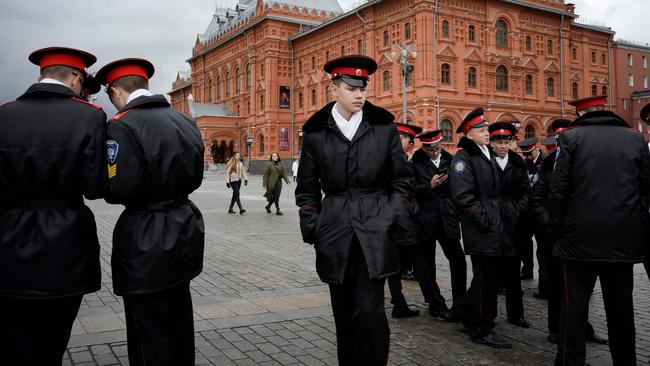
Reports multiplied over the weekend that Russian border guards were turning back some men seeking to leave the country, citing laws on mobilisation.
On Monday, Russian state news agency TASS said Russian citizens who were subject to mobilisation were stopped on the border with Russia and Kazakhstan in the southeastern regions of Kurgan and Tyumen. They were told they needed to seek permission from the military registration and enlistment office to cross the border, the news agency said, citing officials from the regional departments of Russia’s Federal Security Service.
In recent days, a rising number of Russian men have made the journey to the Arctic border with Norway, crossing at the Norwegian town of Storskog, one of the northernmost border posts on Earth. At the town, nearly 1600km by road north of St Petersburg, 243 Russians crossed into Norway on Sunday, a slight increase from previous weekends, said Solve Solheim, section leader for operational immigration control at the police district in Finnmark, where the border post sits.
A 27-year-old Russian reservist who fled to Kazakhstan over the weekend said he had paid 27,000 roubles, around $461, for a flight on Friday from Moscow to Volgograd in Russia’s south, around eight times what it usually costs.
The line at the Kazakh border typically took 30 minutes, he said, but this time he waited 12 hours to enter the country. The Russian train he took from Uralsk near the Russian border to the Kazakh capital Astana was packed with young Russian men, he said.
“I can tell you honestly those leaving are decent men, smart, educated, leaving wives and kids behind,” he added.
Mr Baunov said the mass departure of men of all ages and professions was worrying a trend for the Kremlin.
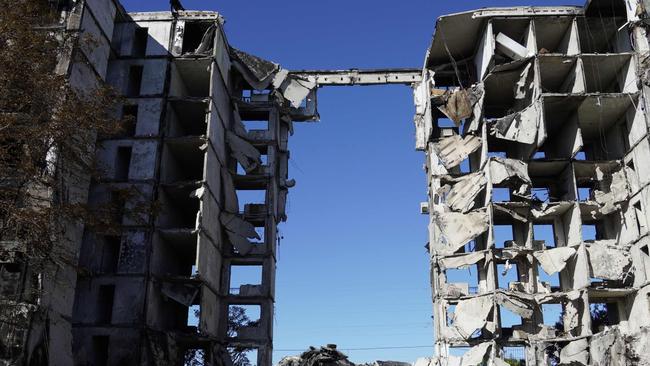
“If it takes several days, it will be tolerated, because the idea is that the troublemakers will leave and the others, more obedient, more quiet, more passive will stay,” he said. “But if it continues for a longer time, then the question of (closing) the borders will arise.” A senator from Russia’s upper house of parliament, Sergei Tsekov, proposed a law on Monday that would bar the exit of all men of military age from leaving the country “in the current situation,” according to the state-controlled RIA Novosti news agency.
Shortly afterward, Kremlin spokesman, Dmitry Peskov, told reporters that no decision had been made on closing Russia’s borders or whether to declare martial law in Russia. Last week, he said reports of an exodus of draft-age men from Russia were “exaggerated”. Since the mobilisation announcement and until Monday, 17 recruitment centres and government buildings had been attacked, according to a tally by Mediazona, an independent Russian media outlet, citing publicly available data.
On Monday, a gunman stormed a school in the provincial city of Izhevsk, leaving 15 people dead including 11 children, before killing himself, according to Russia’s Investigative Committee. At least 24 people were wounded in the shooting, the agency said, adding that it had opened an investigation into the incident.
The Kremlin’s Mr Peskov called the assailant in Monday’s school attack “a neo-Fascist”. The Russian Education Ministry said the suspect had been diagnosed with schizophrenia.
The Wall Street Journal

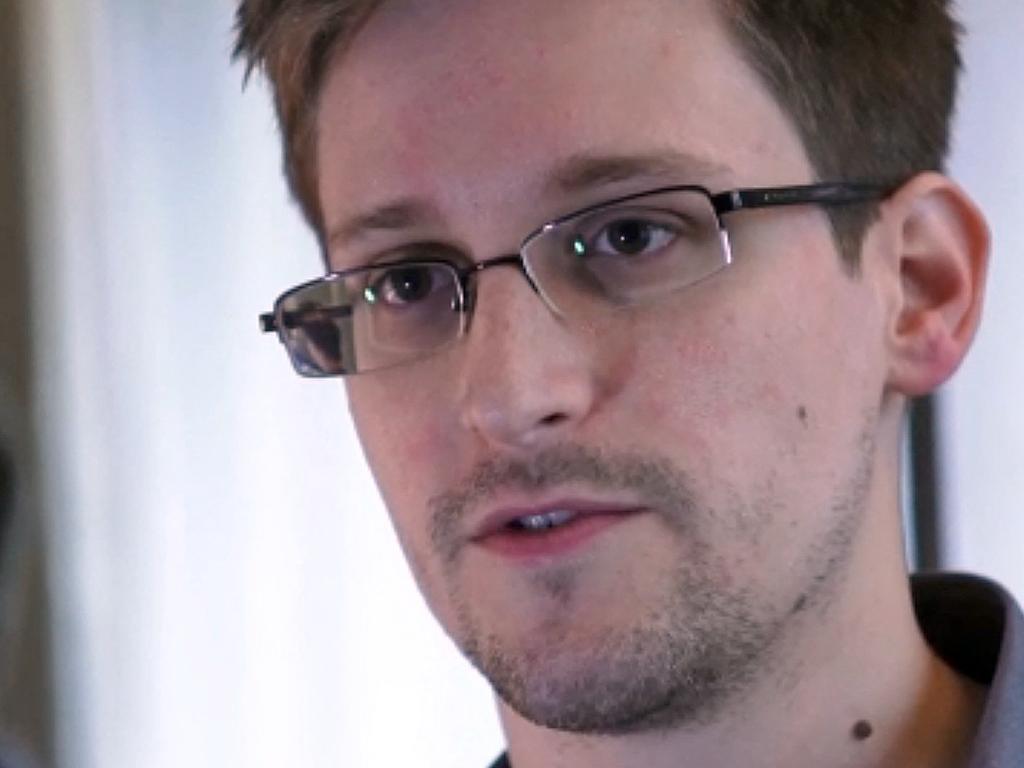





To join the conversation, please log in. Don't have an account? Register
Join the conversation, you are commenting as Logout